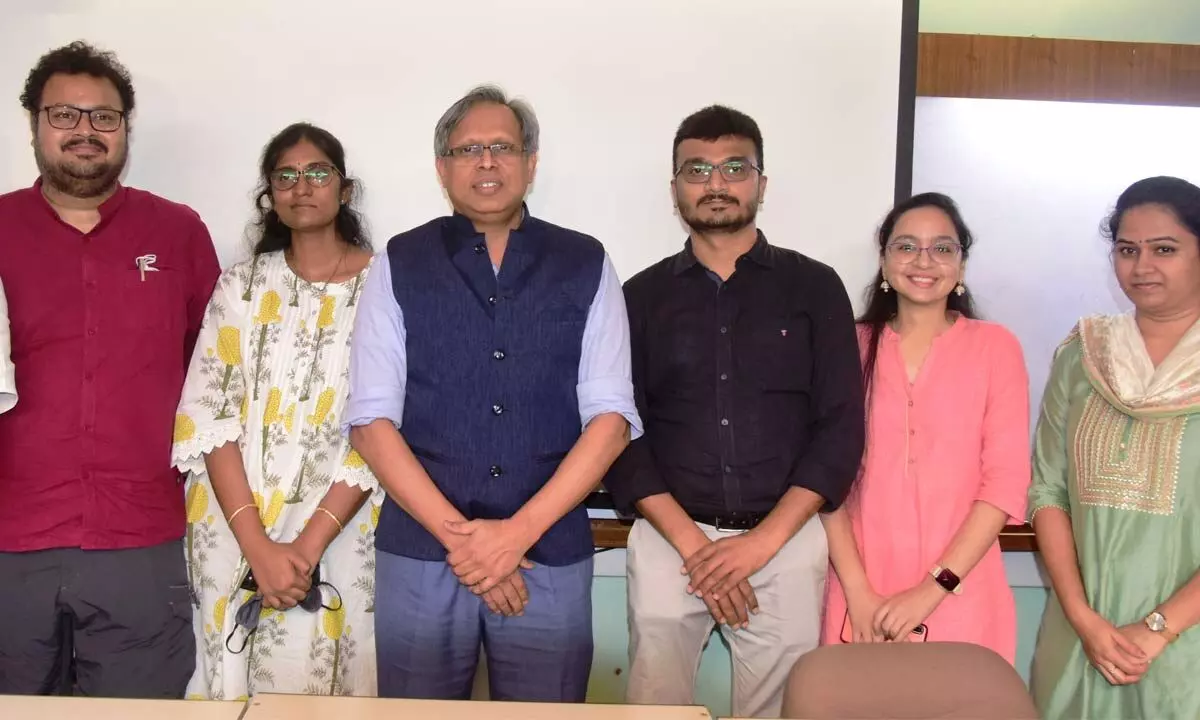Live
- Deepam-2 Scheme Reaches 5 Million Beneficiaries in Three Weeks, says Nadendla Manohar
- Will RG Kar tragedy impact Bengal bypoll results?
- BGT 2024:25: Josh Hazlewood picks four as Australia bundle out India for 150
- BRS rallies support for Lagacharla ‘victims’
- COP29: Scientists, artists, faith leaders call for greater commitment to delivery of climate finance
- Woman donates liver to husband, saves life
- Mechanic Rocky Review: Thrilling Action Film with Twists and Great Performances
- Ponguleti Sudhakar Reddy rubbishes Rahul Gandhi's claims on Modi and Adani
- ‘We can’t take things for granted’: Jayasuriya on balancing formats and Sri Lanka’s path to WTC final
- Prakash Ambedkar ready to 'power' the winner in Maha polls - Mahayuti or MVA
Just In
CCMB develops India's first mRNA vaccine tech


(From left) Dr Madhusudhana Rao, CEO, AIC-CCMB, Dr Rajesh Iyer, project scientist, Dr Nandita Tanneru, Dr Vinay Nandicoori, Director, CCMB, Dr Preethi Jampala, project scientist, Dr Kranthi Kiran Akula, project scientist and Anuiti Vashishit, project assistant
Photo: Srinivas Setty
The CSIR-Centre for Cellular and Molecular Biology (CCMB) has developed mRNA vaccine technology indigenously and is devoid of any technology contributions from elsewhere.
Hyderabad: The CSIR-Centre for Cellular and Molecular Biology (CCMB) has developed mRNA vaccine technology indigenously and is devoid of any technology contributions from elsewhere.
According to CCMB scientists, in the middle of the outbreak of delta variant in August last, scientists at CCMB had started developing an indigenous mRNA vaccine and within less than a year the vaccine has been developed.
Vaccines work by training a person's immune system to identify disease-causing micro-organisms and eliminate them quickly when they encounter them subsequently. The mRNA vaccine technology does this by introducing an mRNA of the micro-organism of concern.
This mRNA in the host cells gives rise to the microbial protein or a part of it, which trains the immune system to evade it when the real infection happens with the same live micro-organism. The team at the Atal Incubation Centre-CCMB (AIC-CCMB) led the development of the vaccine candidate. CCMB Director Dr Vinay Nandicoori said, "My predecessor Dr Rakesh Mishra, former director of CCBM has initiated developing indigenous mRNA vaccine. He said the beauty of this technology is in its modularity and rapid turn-around times.
That means with significantly less effort, the developed technology can be used to sire vaccines for other infectious diseases like dengue, tuberculosis, or malaria.
The CSIR, the largest research and development organization in the Ministry of Science and Technology has taken prescient initiatives to establish capacities within India in modern health technologies as part of its programme on self-reliance. "Right now, we are doing hamster challenge (injecting the vaccine on mice). We are in talks with knowledge partners to take this forward and this part will take little time," he added.
Dr Madhusudhana Rao, CEO, AIC-CCMB and the lead scientist of this work, said, "The current war with Covid-19 pandemic had brought to light many vaccine technologies, and India's vaccine programme is highly lauded. However, we lacked the potent mRNA vaccine technology, as developed by Moderna or Pfizer/BioNtech to combat Covid-19 in the US and Europe. The developed technology is different from mRNA vaccine being developed from Gennova Bio, which is based on self-replicating RNA. The AIC-CCMB team is able to establish mRNA vaccine technology and develop a home-grown mRNA vaccine candidate against SARS-CoV-2 in less than a year since the inception of the project," he said.
Dr Rajesh Iyer, scientist involved in the project, said, "We observed robust immune response against SARS-CoV-2 Spike protein in mice, upon administration of two doses of the mRNA. The anti-Spike antibodies generated were found to be more than 90% efficient in preventing the human ACE2 receptor from binding to the coronavirus. Currently, the mRNA vaccine candidate is undergoing pre-clinical challenge studies to evaluate its efficacy to protect against live virus infection."

© 2024 Hyderabad Media House Limited/The Hans India. All rights reserved. Powered by hocalwire.com






